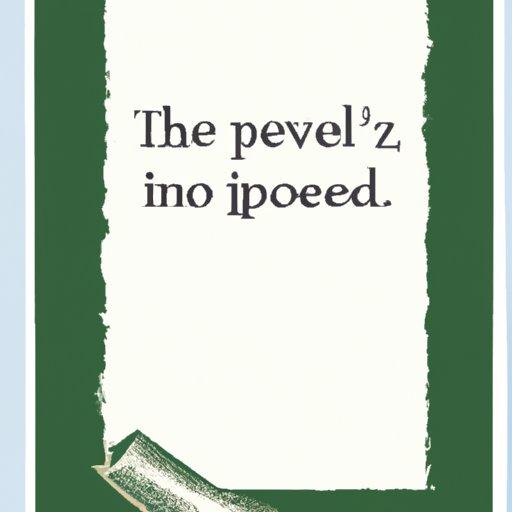
I. Introduction
Poetry is a beautiful and expressive art form that comes in many shapes and sizes. One of the most controversial styles is free verse poetry, which lacks the strict structures of traditional poetry like meter and rhyme. This article explores the truth about free verse poetry and debunks common myths and misconceptions surrounding it. We’ll also take a closer look at why free verse poetry is the future of poetry and how beginners can write their own.
II. Decoding the Myths of Free Verse Poetry: Separating Fact from Fiction
One of the most common myths about free verse poetry is that it’s lazy or lacks skill. However, free verse poetry requires just as much skill to write as traditional poetry, if not more. Unlike traditional poetry, free verse doesn’t rely on strict structures like meter and rhyme to convey meaning. Instead, it relies on the rhythm of everyday speech and unconventional line breaks to create a unique sound and feel.
Famous free verse poems that debunk this myth include “Song of Myself” by Walt Whitman and “The Waste Land” by T. S. Eliot. Both of these poems are highly regarded in the literary community for their groundbreaking use of free verse to convey complex themes and emotions.
III. Why the Debate on Free Verse Poetry Will Never End
Despite its popularity, free verse poetry remains a controversial topic in the literary world. Many poets and critics debate the value of free verse poetry, arguing that it lacks the elegance and grace of traditional poetry. On the other hand, proponents of free verse poetry argue that it is a more democratic and accessible form of poetry that can better reflect the world we live in.
Arguments for traditional poetry include its structurally tight nature, which forces the poet to work within specific limitations, thereby enhancing the quality of the resulting poem. Supporters also argue that traditional poetry has a higher level of perceived elitism. Traditional poetry is often associated with old-world culture like ancient Greek mythology or medieval romances.
Advocates for free verse poetry argue that it can better capture the realities of modern life, which is increasingly fragmented and chaotic. They believe that free verse’s lack of strict structure allows it to portray the world in a more realistic and relatable manner.
IV. Exploring the Advantages and Drawbacks of Free Verse Poetry
One of the advantages of free verse poetry is its flexibility. It has a wide range of techniques and structures, which make it ideal for exploring themes and emotions that cannot be expressed through traditional poetry’s limited conventions. Free verse poetry can use unconventional line breaks, spacing, and punctuation to create a unique sound that is perfect for expressing emotions that defy traditional restraints. Another advantage of free verse poetry is that it makes the art of poetry more accessible to readers who might be intimidated by the strict structures of traditional poetry.
However, one of the drawbacks of free verse poetry is its potential for lack of structure, which can lead to weaker poems if not utilized correctly. Also, not having a fixed structure means that there is no objective criterion for judging the quality of free verse poetry. Thus, making it easier for some free verse poets to pass off poor quality poems.
V. Are Rhyme and Meter Overrated? An Analysis of Free Verse Poetry
Traditional poetry is heavily reliant on rhyme and meter, but free verse poetry relies on natural rhythms and sounds. Rhyming in free verse poetry is not always necessary, as it can sometimes interrupt the poem’s flow and impede the emotions the poet is trying to convey. Meter, too, is less important in free verse poetry, as it doesn’t have the same metrical structure that traditional poetry uses.
Despite this, some poets argue that rhyme and meter are still crucial elements of poetry, and any poems that don’t utilize them lead to a weaker or less impactful result.

VI. Journeying through the History of Free Verse Poetry: What We Know So Far
Free verse poetry has a rich history that spans over a century, from its origins in the early 20th century to present-day. Many notable poets helped develop and popularize free verse poetry, including Walt Whitman, T. S. Eliot, Langston Hughes, and Sylvia Plath. These poets pushed the boundaries of what was considered poetry at the time and opened the door for future generations of poets to do the same.
VII. Why Free Verse is the Future of Poetry: Debunking Traditional Poetry Myths
Free verse poetry represents the future of poetry because it is better suited for modern audiences and cultural contexts. It is more accessible to a broader range of readers due to its easy-to-understand structure. Free verse can express modern themes that traditional forms of poetry cannot, freeing poets from the constraints of a more formal poetic structure.
Contrary to what traditional poetry supporters assert, free verse poetry does not lack structure. Instead, poets use a series of literary devices to provide structure, such as repetition, alliteration, and assonance.
VIII. The Art of Crafting Perfect Free Verse Poetry: Tips and Techniques for Beginners
Writing free verse poetry is a skill that must be honed, like any other art form. If you’re a beginner, there are several things you can do to improve your free verse poetry skills. One way is to experiment with different structures and styles to see what works best for you. You could try writing a poem using a particular theme or mood in mind and using creative imagery and unconventional line breaks to express it. You can also read works by established free verse poets to inspire you and give you ideas.
Another technique for crafting perfect free verse poetry is to use rhythm and patterns to create structure without relying on rhyme and meter. You can use meter to create a pattern in your poem, without using a fixed meter like a traditional poem. Use of repetition for instance can give a poem a certain cadence that provides the poem with structure.
IX. Conclusion
In conclusion, free verse poetry is a unique and beautiful art form that offers both advantages and drawbacks. While it may lack the structure of traditional poetry, free verse poetry has the flexibility to convey emotions and themes that other forms cannot. The debate over whether or not free verse poetry is better than traditional poetry will never be fully resolved, but what is certain is that it is better suited for modern audiences and contexts. The most important part of writing free verse poetry is to find a style and structure that works for you and to keep practicing.




